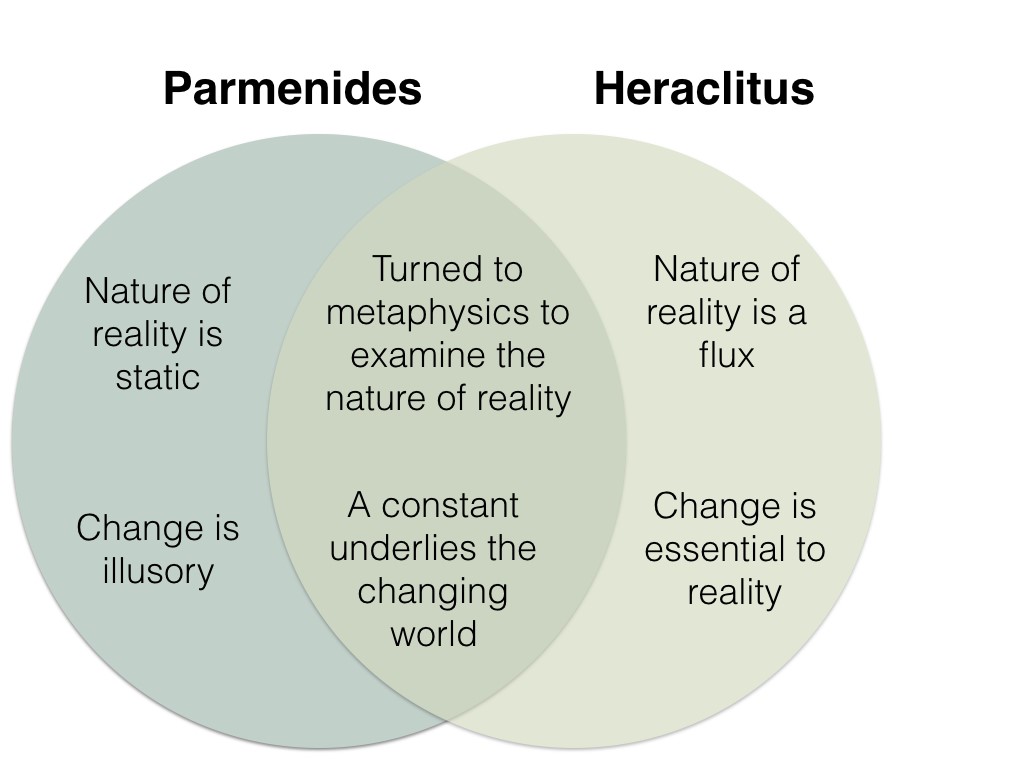Table of Contents |
Though he was not affiliated with any philosophical school, Heraclitus, like Parmenides, was influenced by the rational theology established by Xenophanes. Recall that Xenophanes disparaged the practice of turning the gods into fickle meddlers in human affairs, and thought that actions taken by the gods were constant (i.e., according to the laws of nature). Heraclitus went further than his predecessors by emphasizing the human role in affairs. His approach to reality was entirely secular. He maintained that there was one true version of reality which he called the Logos.
Heraclitus believed that the Logos governed and/or organized all things and that it did so independently—without the participation of the gods. Although it is not clear whether he intended Logos to be distinct from reality (like a god) or dispersed through everything in the universe, all things in the cosmos are unified according to the Logos.
The Logos belongs in the realm of metaphysics because it is not in the world we experience but underlies it. Though difficult to understand, the "Logos" can be comprehended by humans, even though not all of them are capable of grasping it. The Logos is always true, whether anyone is aware of its reality or not. It is independent of knowledge and language, and it belongs in the realm of metaphysics.
The two most significant principles through which Heraclitus’ Logos governs are the Unity of Opposites and the Doctrine of Flux.
The Unity of Opposites is an assumption that the world is composed of opposites and that opposites are linked in a system of connections.
EXAMPLE
There cannot be a mountain without a valley, and vice-versa. People cannot awaken if they have not first been asleep, and vice versa. Things are linked to what they are not. Heraclitus points out, for example, that ocean water is toxic to humans but necessary for fish. The opposite is true of fresh water.Beyond simply pointing out these unities, Heraclitus locates them inside us. He maintains that youth and age, life and death, are already within us. One quality becomes the other. Each of them changes into its opposite—young becomes old, life becomes death, healthy becomes ill.
Human beings occupy a privileged position in the universe according to Heraclitus. He indicates that our souls are connected to the Logos through language, a human phenomenon.
Heraclitus’ Doctrine of the Flux is closely related to the unity of opposites. It states that all things change over time. Everything is impermanent, and is in a constant state of change, moving from what it is to what it is not. He famously declared that you cannot step into the same river twice, since, as water passes ceaselessly, the river becomes new. (The Heraclitans later pointed out that you cannot step into the same river once.) You are not the same person you were yesterday.
Heraclitus holds that change is the ultimate nature of reality. All is flux. However, when reading the philosophy of Heraclitus, we must be careful to avoid taking some statements too literally. For example, Heraclitus' assertion regarding change is sometimes translated as a claim that all is fire. This should be read metaphorically and in light of the rest of the text. Fire flickers, and in doing so it changes constantly. Saying that all is fire is a metaphorical way of saying that all is changing.
Recall that Parmenides claimed that the ultimate nature of reality is static and that change is illusory. Heraclitus, on the other hand, asserted that the ultimate nature of reality is change. It may be tempting to view them as polar opposites, philosophically speaking. In doing so, however, we would ignore significant points on which they agree.
Both Parmenides and Heraclitus join Xenophanes in turning from divine causation and oracular knowledge to a secular concept of reality. For both of them, this involved examination of what is universal and regular in nature, rather than what is random. Both of them studied metaphysics, searching for the first principles and the ultimate nature of reality. They both recognized that the world of appearances is in constant flux and that it is impermanent.
Parmenides and Heraclitus believed that something constant underlies the impermanent world of change. Parmenides identified it as the realm of being, the realm of what-is Heraclitus posited a Logos that contains the universal principles of the Doctrine of Flux and the Unity of Opposites.

Source: This tutorial was authored by Sophia Learning. Please see our Terms of Use.